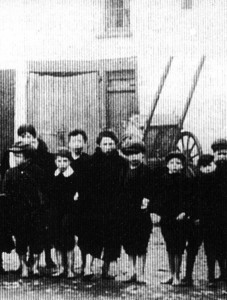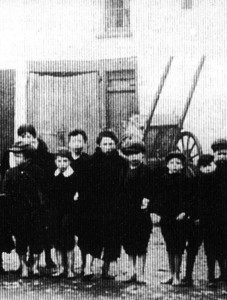Dublin’s East wall celebrates Centenary of 1911 School Strike

United We Stand!
School strike in East Wall remembered 100 years since school boy strike of 1911
This year marks the 100th anniversary of the East Wall school boys strike. On 13th September 1911, teachers arriving at the East Wall Wharf National School found a message chalked on the door, “Any boy cot going into school and not following other schoolboys examples will be killed by order Strike Strike Strike”. Pickets were placed in the vicinity of the school, and boys paraded around carrying flags with their demands. These included “shorter hours, cheaper books and an end to canings”. The strike was to continue for three days, with pupils attempting to enter the school being branded as scabs and pelted with stones and cabbage stalks. The age of those involved was between 8 and 13 years old.
The school boys strike took place against a background of growing industrial unrest in Dublin which eventually led to the 1913 Lockout. The effect of trade union militancy on the boys was highlighted by the local parish priest Father Brady who stated – “Strikes were in the air at the time, and the residential quarters of the general strikers were all around the school.”
Local residents Joe Mooney and Sarah Lundberg are currently working on a local history project, including an examination of original school records.
Joe Mooney describes the boys involved: “Were the school boy strikers the Bash St. Kids or were they children of the revolution? There was a touch of both about the events of 1911. I believe there demands were reasonable, and the methods were clearly influenced by the trade union movement which was very active at that time on the docks.”
Mr Mooney continued “The co-ordination of the pickets was effective, and there is some evidence that they tried to draw other schools into their actions. They seemed well versed in the tactics of “Larkinism”.
Sarah Lundberg commented on the demands made by the strikers: “Their demands were reasonable. School books were expensive for working class parents, school buildings were uncomfortable for long hours and excessive discipline is never welcomed by children”.
Ms Lundberg continued “The Boys were very articulate, and were able to explain their demands to a journalist who approached them. There was awareness that school books were free in England, and they were clear in their desire to be treated fairly.”
In looking at the outcome of the strike, and in judging it’s value, both Joe and Sarah agree: “While publicly the boys’ actions were dismissed as mischief making, records show that an investigation into the strike did take place. This raised questions about the running of the school, so perhaps the boys were successful to some degree”.
For further details contact:
Joe Mooney 087 669 8587
Sarah Lundberg 087 228 3351
Issued by Padraig Yeates, PYE Comm, 01 828 4510 and 087 260 5297

